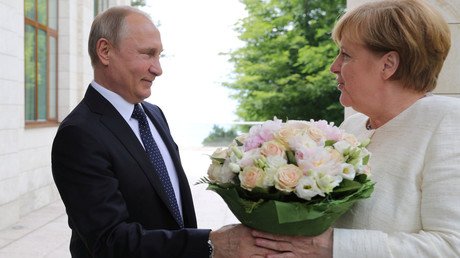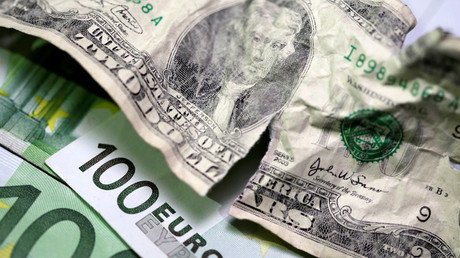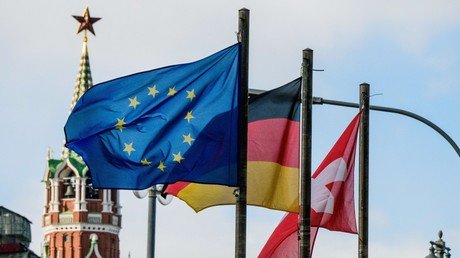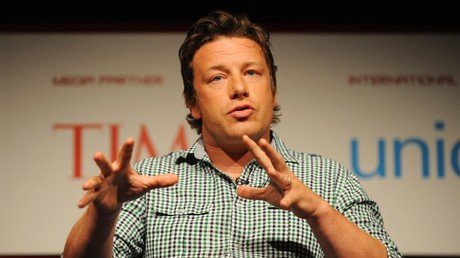Will the US and UK freeze the German-Russian thaw?
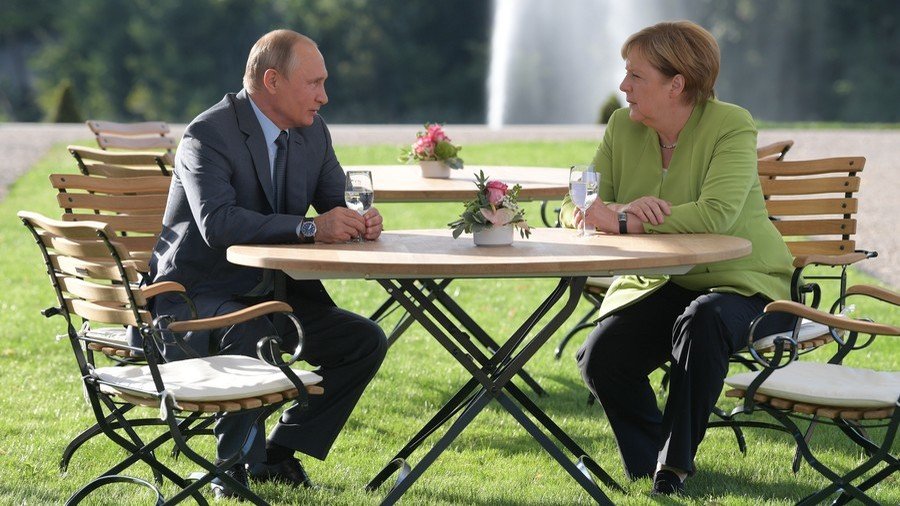
We’re seeing some positive steps in relations between Berlin and Moscow. Could it lead to joint Russian-European opposition to US hegemony? Or will it be sabotaged by the US and its Trojan horse, Britain?
Last Saturday’s meeting in Germany between Vladimir Putin and Angela Merkel can be seen as another sign of a growing rapprochement between the two great powers that the leaders represent.
If so, it’s surely welcome for both countries – and for Europe as a whole, which would benefit enormously from rebuilding economic ties with Russia.
However, the US will not be happy. It wants Europe to buy its own, more expensive liquefied natural gas (LNG), and for Germany to cancel its Nord Stream 2 gas pipeline project with Russia, which it is pursuing to secure cheaper energy supplies.
American policy has, for decades, been to prevent mutually beneficial link-ups between Europe and Russia. Any continental leaders who wanted closer links with Moscow have been regarded with suspicion (or worse) by Washington hawks.
The great French patriot and World War II hero of the anti-Nazi alliance, Charles de Gaulle, dreamt – in the words of his biographer Jonathan Fenby – that a rapprochement with Moscow would open the way for a ‘Europe from the Atlantic to the Urals.’ De Gaulle announced that he was taking France out of NATO’s military High Command in 1966, and then talked of a ‘new alliance of Russia and France’ on a visit to the Soviet Union. The French president – and this is very relevant to what is going on today – said ‘Non!’ to the UK’s entry into the EEC not because he was anti-British, but because he believed that inviting Britain would be tantamount to inviting the US in too. He warned that British membership would lead to “a colossal Atlantic community under American dependence and leadership, which would soon absorb the European Community.”
If there is a heaven, then I’m sure the good general is looking down on Earth this week, with an ‘I told you so’ look on his face – because look what’s happened.
Just three days after the Putin-Merkel meeting, UK Foreign Secretary Jeremy Hunt intervened to call for the EU to stand “shoulder to shoulder” with the US on Russia. He urged the EU to implement even tougher sanctions on Moscow.
Forget that the UK is supposed to be leaving the EU in March 2019: the British elite still want to dictate European policy and get EU countries to put US interests before their own. Even the Austrian foreign minister’s choice of wedding guests came under attack with Tom Tugendhat, chair of the Foreign Affairs Committee, taking to Twitter to lambast Karin Kneissl for inviting Vladimir Putin. “Whose side is she on?” asked Tory Tom, echoing George Bush’s infamous “You're either with us or against us” statement. I’m sure it was a surprise to Ms Kneissl that she was expected to submit her list of wedding guests to the Conservative MP for Tonbridge and Malling for prior approval.
Never mind that the UK authorities have still presented no hard evidence that the Russian state was behind the poisoning of Sergei and Yulia Skripal in Salisbury earlier this year – which is the latest excuse for ratcheting up tensions with Russia. The US and UK say ‘Jump!’ and the response they expect from the rest of Europe is ‘How high?’
The double standards are off the scale. Israel (rightly) hasn’t expelled a single Russian diplomat over the Skripal case. There are no calls from the US or UK for Israel to impose sanctions on Russia. Yet Europe is put under pressure to commit great acts of self-harm.
It’s no exaggeration to say that – faced with a choice of following US neocons along a potentially catastrophic path of confrontation with nuclear-armed Russia, or acting sensibly to diffuse tensions – the EU is at the most important juncture in its history. Germany is the key country that will determine what happens next.
Three years ago, no less a personage than Jean-Claude Juncker, the European Commission president, declared while on a visit to Germany: “We must treat Russia decently. We can’t let our relationship with Russia be dictated by Washington.”
But alas, that’s what’s happened – and the financial costs have been extraordinary. Last year, the Austrian Institute of Financial Research calculated the cost to the EU of Russian sanctions and Russian counter-measures to be $30 billion. Other studies have put it even higher. Without doubt, we’re talking about the most expensive act of economic suicide in history.
Out of all the European countries, it’s Germany that has taken the biggest hit. “Germany accounts for almost 40 percent of lost trade in the West, while other major geopolitical players such as the United Kingdom (7.9 percent), France (4.1 percent) and the United States (0.6 percent) are far less affected,” reports the Kiel Institute for the World Economy.
It’s not surprising, therefore, that Angela Merkel, who saw her party’s share of the vote drop by over eight percent in last September’s election, is coming under intense domestic pressure to change course. The right-wing AfD party, which made a historic breakthrough last year with 13 percent of the vote, and which continues to poll strongly, wants sanctions on Russia lifted. So too does the socialist Die Linke party. In May, Die Linke Chairperson Sahra Wagenknecht said that the ‘Ice Age’ against Moscow must be ended and that EU sanctions against Russia “primarily harm European and German companies.”
There are also factions in both the ruling CDU/CSU and the SPD who want Germany to stand up more forcefully to the US in defense of German jobs and business.
It’s not just sanctions on Russia that the US is aggressively pushing. Washington is also targeting Europe with its newly re-imposed sanctions on Iran, which in true school-playground-bully fashion penalize companies and financial institutions that do business with the Islamic Republic.
Deutsche Welle reported earlier this month how these sanctions worry German companies – which are already reeling from the collapse of the Russian market. German exports to Iran were worth over $3 million last year. If that’s lost, think how many jobs will go.
It’s these Iranian sanctions, along with Trump’s tariffs on steel and aluminum imports, which could and should be the straw that broke the German camel’s back. Writing for the business newspaper Handelsblatt, German Foreign Minister Heiko Maas said that the EU should form a ‘counterweight’ to the US when it crosses ‘red lines.’ He called for Europe to set up payments systems independent of the US.
Washington has gone too far, and German capital and the representatives of organized labor have had enough. Merkel must now step up to the plate and ignore those who want her country to continue to act against its own best interests. That means lifting sanctions against Russia and continuing to trade freely with Iran. The bluff of the US paper tiger and its Trojan horse Britain needs to be called. For the good of Germany, for the good of Europe, and indeed for the good of the entire world.
Follow @NeilClark66
Subscribe to RT newsletter to get stories the mainstream media won’t tell you.
The statements, views and opinions expressed in this column are solely those of the author and do not necessarily represent those of RT.

